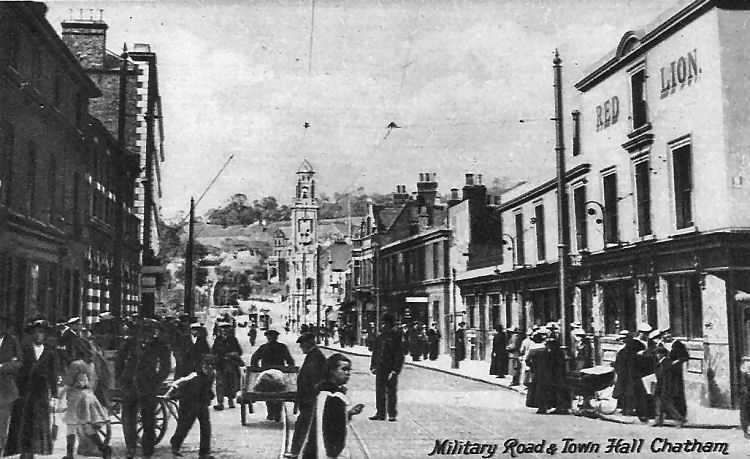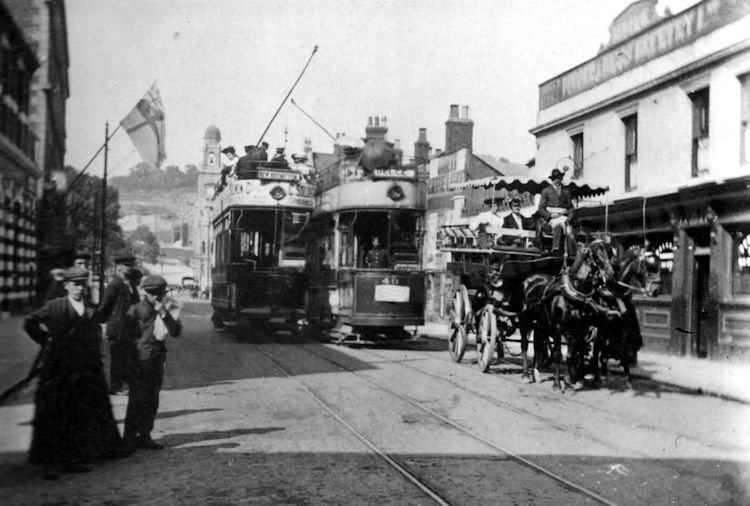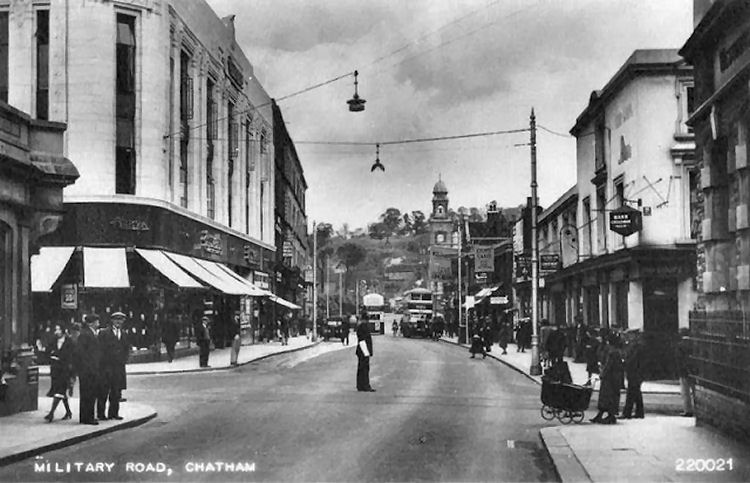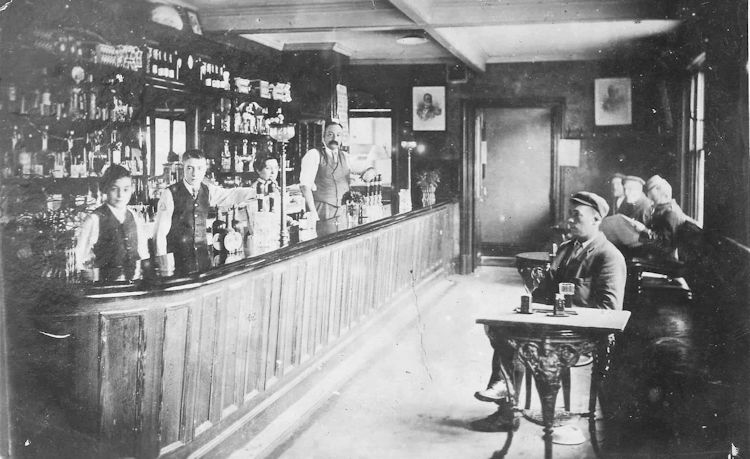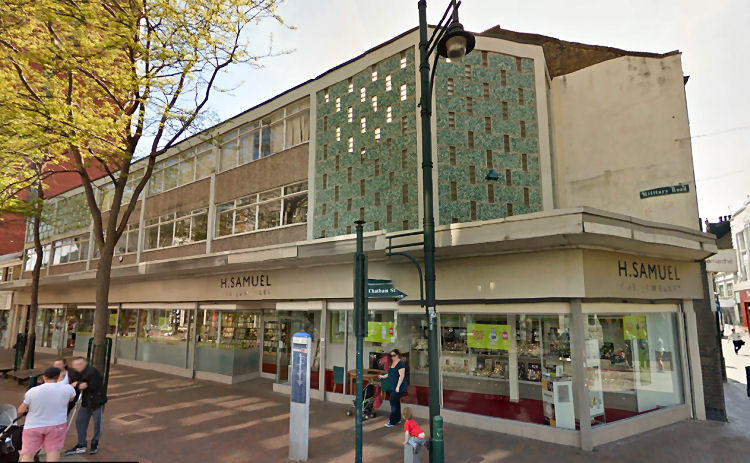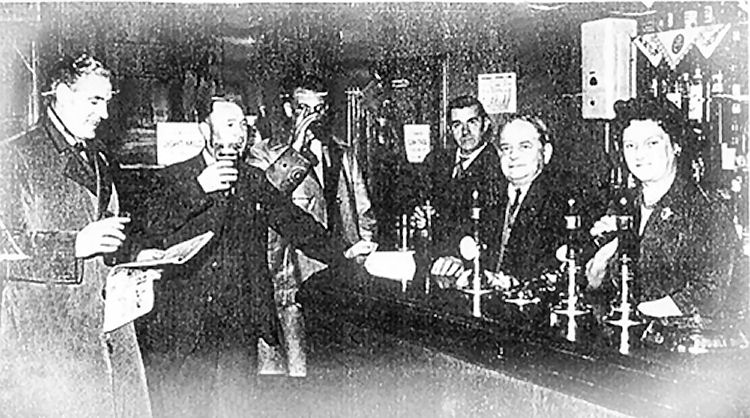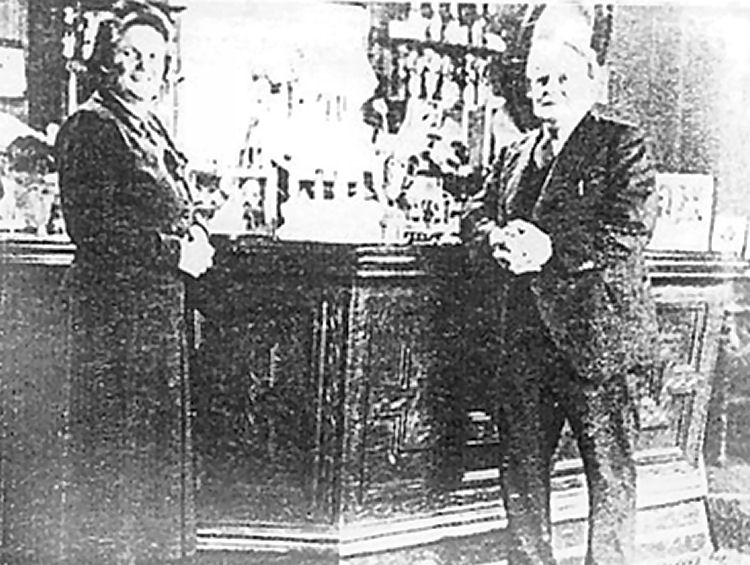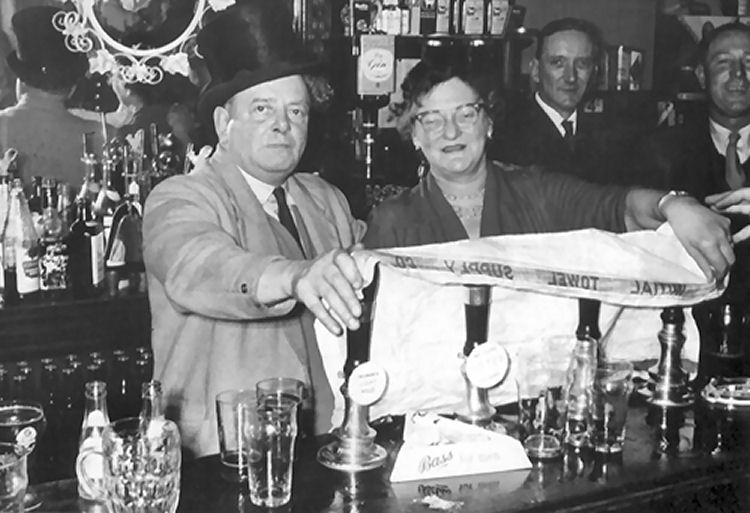|
Whitstable Times and Herne Bay Herald, Saturday 21 February 1920.
Murder and Suicide at Chatham.
Revolting story told at inquest.
Principal witness censured by the coroner and jury.
The chief witness, a man named Charles Gambrill, was censured by the
Coroner and jury at an inquest held at Chatham on Friday, states "The
Chatham News."
The inquiry was respecting the death of Ellen Fisher, age 32, the wife
of an Acting Company Sergeant Major in the R.A.S.C., and Charlie Sutton,
a single man, age 28, whose occupation was that of an armour's mate in
the Royal Navy, and the jury found verdict of wilful murder against
Sutton as regarding Mrs. Fisher, and suicide during temporary insanity
as regards his own end.
After evidence of identification have been given, George Edward Baldock,
armourer's mate, of the Royal Navy Barracks, said he knew the deceased
man Sutton, who was stationed at the Barracks. He last saw him on Monday
evening, just before 5 o'clock. He was just the same as usual. Witness
had seen both Sutton and Mrs. Fisher together. That was in the "King's
Head" public house last Friday week, when witness was having a drink. He
went out and left them both there. The next morning witness asked Sutton
who he was with the night before. He told with that he had been living
with her.
What else did he tell you?
That he had been living with her, and left her about Christmas. He said
he had had a few words with her over a note he left on the table.
Witness believed it was a £1 note.
It might have been a Treasury note or a message?
Yes. He left it there overnight, and took it away next morning.
What sort of a temper had this man?
A quiet disposition; a very nice chap.
Thomas Robert Mogg, armourer's mate, Royal Navy Barracks, Chatham, said
he knew Sutton, whom he last saw alive on Monday. He was with him all
that day, and he seemed strange in his manner, for witness and he had
been together for four years. At times he had a "funny" temper. Witness
said something to him, and he muttered something about "I'll kill her."
Witness and seen this woman with him before.
Did he appear to be upset about something?
Yes, very much.
The Coroner:- Surely he must have said something before he threatened to
kill somebody.
No, sir. I can't remember.
He was talking about a girl, was he?
Yes.
Did he mention any names?
No, none whatever. I was with him one night ashore about a month ago,
and there was an upset in Peter's Supper Bar, and that was the night I
knew he had been keeping company with this woman.
Did you know her name?
No, I never knew until I saw it in the papers.
Never mind what was in the papers.
I can't tell you her name, then.
You knew he had been in the company of a girl?
Yes.
You have seen the body. I suppose?
Not the body of the woman.
Sergeant Golding interposed with the remark that there was a photograph.
The Coroner (to the jury):- I think we must take witness's evidence
generally. He is able to say that the deceased had a grievance against a
girl; he can't tell us her name.
In answer to a juryman, witness said he had never been to the woman's
house.
Arthur Richard Horton, licensee of the "Red Lion," Military Road,
Chatham, said he knew Sutton as a customer at the house. He last saw him
at 9:45 on the night previous to the tragedy; he was at the "Red Lion"
for about two hours.
Was he sober then?
Yes. He was always a sober man.
Did you have any conversation with him?
In the ordinary way. That's all.
Did he seem to have anything on his mind?
No.
Did he say where he was going when he left?
No.
Witness added that deceased woman had been in the house that same
evening, but Sutton said she were not together; he had never seen them
together.
Did they recognise one another?
Not in my presence.
How long was Mrs. Fisher there?
About half an hour.
By the foreman:- Both persons were in the same saloon bar; but they were
apart.
Mrs. Louisa Maud Sherfield, of 64, Henry Street, Chatham, said she, too,
so Mrs. Fisher on Monday. They were together in the "Red Lion" at about
8:30 or 8:45 p.m. They had a drink and left near two o'clock. Witness
knew Sutton but she did not see him at the "Red Lion" that evening.
It's a large bar, is it?
So many corners in it.
Did Mrs. Fisher notice him?
I couldn't say. I don't think she did.
Did you have any conversation with her about Sutton that night?
No.
Was Mrs. Fisher sober when she left?
Perfectly.
Did you leave together?
Yes.
Where did you part company?
At the top of Clarendon Hill in the car. I got off and she continued her
journey. That was about 11.
Did Mrs. Fisher go home alone or was there anyone with her?
Witness:- She was with another gentleman.
Who?
The gentleman behind here, Mr. Gambrill.
That was when you left at 11? o'clock?
Yes.
Has Mrs. Fisher ever said anything to you about Sutton as to any
quarrel?
Nothing at all; she kept her own counsel; kept things very much to
herself.
Charles Gambrill. E.R.A., Royal Navy, said he knew Mrs. Fisher, although
he had not known her long; he met her at about the beginning of
December, he having returned to Chatham at the end of November.
During that time, how do you know her intimately?
No, just introduced to her by friend in the "Prince of Wales."
Asked by the Coroner to give his story in his own words as to his
movements on Monday night, Gamble said he had recently returned from 28
days leave. He left the barracks at 8 o'clock and went to the "Prince of
Wales" and had a drink. Mrs. Fisher and this woman (pointing to Mrs.
Sherfield) were there. He stood there for a little while, and then spoke
to Mrs. Fisher and the other woman. They all had a drink together, and
the woman left. He remained a little longer, and then went to the "Army
and Navy" public house.
Did you make any sort of arrangements to meet later?
No.
Witness (continuing) said he was in the "Army and Navy" until 9:30. Then
he walked up the street, and returned to the "Prince of Wales." He was
there some time, when Mrs. Fisher came back, and was there until 10
o'clock.
You left with them?
Yes.
Where did you go?
She asked where I was going. I told her I was going back to Barracks,
but she asked me if I would have some supper and see her home.
Witness added that Mrs. Fisher had spoken to him about Sutton; should be
worried about him, and said he had threatened her.
Did Mrs. Sherfield hear her say that?
No, she was speaking to someone else.
What did Mrs. Fisher tell you?
That he had been molesting her, and that she was frightened of him.
Did she say why she was frightened?
No.
Did she say in what way he had threatened her?
No. We all had supper together after leaving the "Prince of Wales." I
didn't want to go with them, because I had had my supper before leaving
Barracks, but she implored me to go home with her, and we got on a tram.
Arriving at Mrs. Fisher's house, said witness, he went indoors with her,
and I stood speaking, and Sutton's name came up again, when she again
complained of his following her; she could not understand, she said, why
he forced himself on her. Sutton had called at the house once or twice,
and she had told him to go.
Then, said witness, he left the house. She asked him to return again. He
went to Navy House, and booked a bed.
Why did you want you to come back?
To see if she was all right.
Didn't she give any other reason?
No.
We promise to return?
Yes.
And you went back?
Yes.
Witness proceeded:- She showed me some photos. I had been there about 10
minutes when there was a knock at the door. Mrs. Fisher, expecting it to
be Sutton, asked me to go upstairs. "I expect it's him," she said. I
went upstairs and she blew the light out, and answered the door. I stood
in the bedroom and heard him ask her if he could come in. She said, "No,
you can't come in! I've told you before that you can't come in!" "But
I've got nowhere to sleep," he said, and she told him then to go to the
Salvation Army or Navy House. Sutton said, "Let me come in, I can sleep
on the couch." I then heard no more speaking but a sort of a blow.
Did you hear any scuffle?
No.
Any threat?
No.
Had there been any scuffle he would have heard it?
Yes.
And had there been any screaming he would have heard it?
Yes.
Witness added that it was quite possible there might have been some more
conversation which he couldn't hear. "As soon as I heard the blow I came
downstairs," said witness. "The blow was as though someone had fallen.
That was two or three minutes later."
Gambrill went on to describe what he did next. When he went down the
stairs in the darkness. Mrs. Fisher was standing up against the wall at
the front of the stairs, and as he reached the foot of the stairs so she
fell.
But I thought she had fallen before. Wasn't that the noise which you
heard?
No, it was Sutton. I went to put my hands on her and they were wet with
blood. I heard a noise like water, but could not see what had happened
in the dark. I went upstairs to get my coat, and then went out and found
the police in New Road.
Didn't you turn to Mrs. Fisher at all?
No.
She might not have been dead then?
I couldn't see in the dark.
Didn't you think it was necessary before even sending for the police to
see what you could do. She was not quite dead?
(Witness made no answer.)
Did you return with the police?
Yes.
She was in the same position as he left her?
Yes.
Did you assist the police?
Yes.
What position was Sutton in?
Lying on his back with his head just inside the door.
Witness added that the open razor laid between the bodies.
Sutton must have forced himself inside.
Yes.
The Foreman:- Knowing what she had already threatened, did you take any
precautions to guard her?
No.
Buy a juror:-
The bedroom door upstairs was not closed.
Evidence was given by Police Constable Shilling, K.C.C., to being called
by Gambrel.
Police Sergeant Golding spoke to go into the house at 1:40 a.m., when he
was called by Police Constable Collier. The next door neighbour, Mr.
Harris, was knocked up, and he was asked whether he would be good enough
to take the two children in so that they should not see what had
happened. He did so. Witness then searched the body of the deceased man,
and in his pocket found a wallet, in which were two postcard photographs
(produced). On the backs were written a message, and there was also a
note about Mrs. Sherfield.
The Forman wondered whether the message which had now been handed round
to the jury, had any bearing upon this inquiry.
The Coroner thought it had. It was an important matter. The message
suggested that the act was premeditated on the part of Sutton, it showed
motive.
The Foreman:- He simply gives her a character.
The Coroner:- But he says, "Forgive me," as though he contemplated
something.
Dr. H. J. Bryan, police surgeon, Chatham, stated that the direction of
the woman's wound rather suggested that her assailant attacked her from
behind, and so deep was the worms that death must have occurred within a
few seconds. Probably her body was just leaning against the wall when
Gambrill saw her falling. There was no evidence of any struggling so far
as bruises would leave one to think. The man had cut himself higher up,
just below the chin, and had severed all the vessels and muscles right
across the throat.
Can you express any opinion that the wound was self-inflicted?
I'm afraid I can't. It might have been and probably was.
The Former inquired if there were evidence of any disease.
The Coroner said he had not ordered a post-mortem examination, because
he did not think it necessary.
Dr. Bryan said, as a matter of fact, there was evidence of venereal
disease.
The Coroner:- Did you examine both?
No, only the man.
Upon the two postcards being handed to Sutton's father he identified the
handwriting as that of his own.
Coroner read the note as follows:- Dear Sister. - Forgive me doing this.
I am no good now. This woman has ruined me. I met her last August, and I
have been in her grip ever since. Last Wednesday night was my last night
with her. I didn't know she was one of the bad woman until she got me in
her grip. I couldn't get away from her. I have been living with her for
months. She wanted me to take her away last week. She is the most known
bad woman in Chatham. I hope the police will get hold of her and punish
her heavily. - Goodbye, Charlie.
The Coroner having summed up, the jury returned to consider their
verdict.
After a quarter of an hour's absence the Forman announced that they
found that Mrs. Fisher met her death at the hands of Sutton, and that
Sutton met his death at his own hands in a fit of passion. The jury also
desired to state that the evidence of Gambrill was not satisfactory, and
his conduct deserved censure in the fact that he did not guard the woman
when asked to do so, and also that he did not attempt to render
assistance before going for the police.
The Coroner:- Then you return of the verdict of wilful murder against
Sutton, and suicide in a fit of passion. Do you mean that he was not in
a sound mind?
The Forman:- Yes; temporary insanity.
The Coroner here called Gambrill forward and told him the jury's wish
that he should be censured. His position might have been a difficult
one, but instead of being upstairs he should have rendered all the
assistance he could.
(Gamble:- I am sorry.)
And he agreed further with the jury, and it had struck him at the time
of hearing the evidence, that he found Mrs. Fisher in this position and
yet he seemed to have gone upstairs for his coat. No ordinary person
would have bothered about his coat on such an occasion; any ordinary
person, in his senses, would have thought what could he do to have save
the woman's life.
Gambrill interposed again with the observation that the whole of there
was such a shock to him.
The Coroner:- But you weren't shocked so much that you forgot to go
upstairs for your coat.
The Foreman also stated that the jury desired to express their sympathy
with a parents of Sutton and with the husband of Mrs. Fisher.
The Coroner accordingly expressed the sympathy to the relatives.
|
